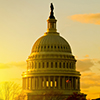 (Sept. 19, 2025) – Last week, I traveled to Washington, DC, and made the rounds on Capitol Hill with different Kansas hospital executives. The conversations we had were enlightening, especially considering the tense, hurry-up-and-wait atmosphere regarding health care policy.
(Sept. 19, 2025) – Last week, I traveled to Washington, DC, and made the rounds on Capitol Hill with different Kansas hospital executives. The conversations we had were enlightening, especially considering the tense, hurry-up-and-wait atmosphere regarding health care policy.
Everyone has now had a chance to exhale since the passage earlier this summer of the One Big Beautiful Bill Act, but many policy items still need to be addressed either by the end of the federal fiscal year on Sept. 30, 2025, or by the end of the calendar year. It appears the House is preparing to consider a so-called "clean" continuing resolution that would extend the fiscal year 2025 budget to the week before Thanksgiving.
This bill would include all of the typical health care extenders like the Affordable Care Act Disproportionate Share Hospital cut delay, as well as telehealth, Medicare Dependent Hospital and Low-Volume Hospital program extensions. This would give time for Congress to pass individual funding bills for fiscal year 2026 or move them in packages that combine three or four of them at a time. Both Appropriations Committees have reported their Labor-HHS-Educations bills, so there is some hope this might actually be achieved this year, but in years past, Congress often falls back on a long-term continuing resolution or an Omnibus bill.
Not included in the short-term continuing resolution being considered by the House is an extension of the ACA's enhanced premium tax credit. As such, this was the main topic of conversation between our groups and members of Congress last week. We feel our concerns were well-received in our Congressional meetings, particularly since they are now aware their constituents will start to see policy premium cost increase notices around about the same time they will be considering the FY 2026 budget endgame later this year. We discussed how 160,000 Kansans will be affected by these increases, and the hardest-hit age category will be 55-65. In order for us to be successful, we will need to continue our education efforts about the impact this policy has on Kansans.
Additionally, we asked our representatives to avoid using site-neutral payment schemes as an offset for any health care extenders. As always, we discussed how hospitals — including hospital outpatient departments (known as HOPDs) — are fundamentally different from rural health clinics and physician offices, since we are required to abide by EMTALA regulations.
Last week, we achieved a major 2025 federal policy goal: our 2025 provider tax pre-print was approved by the Centers for Medicare & Medicaid Services! This could only have come about by countless hours of multiple individuals working to get it approved in Topeka and Washington. We cannot thank our Kansas Congressional Delegation enough for both working to get our provider tax changes grandfathered into the OBBBA and eventually approved by CMS Administrator Dr. Oz.
There is still much to do: we have our 2026 provider tax pre-print to work through the system, and we need to ensure good policy outcomes this fall for hospitals on the issues mentioned above, as well as on the 340B Program and Rural Emergency Hospitals. Our fall season is off to a good start; however, we will keep working to maintain this momentum!
--Chad Austin